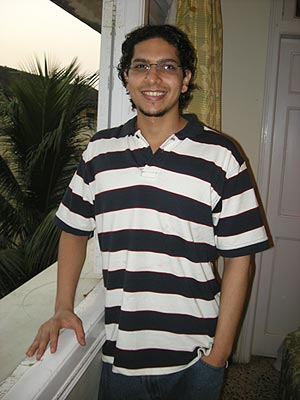
The Common Admission Test or CAT is the gateway to not just some of the best B-schools in the country but also to better job prospects and a better career. MBA aspirants across India put their studies/jobs on hold as they gear up for possibly one of the most challenging tests in the world. This year, with the CAT being a computer-based test (CBT), the challenge is even greater. So how are students preparing to face the test?
As part of a continuing series on CAT aspirants, we get test-takers to share their experiences. Here, Khushroo Antia spells out his mantras.
Also read:
'MBA helps you break the glass ceiling'
'MBAs are high in demand but low in supply'
Sitting in his apartment in South Mumbai Khushroo Antia looks cool as a cucumber. The 29-year-old chartered accountant (CA) who appears for CAT 2009 doesn't look the least bit fazed.
Interestingly unlike some of his contemporaries, Khushroo started his preparations for the examinations much later.
He says, "I began my CAT classes somewhere in the end of July. But it was around August that the pace really kicked in. By then I had already resigned from my job at KPMG (a top deck multinational consulting firm) and was wrapping up the projects I was working on."
With a background in accountancy Antia plans to major in finance and hopes to study the agri-business management course in IIM-A 'because it is the future'.
"Agriculture will be tomorrow what crude oil is today. And India will be one of those countries that will be at the centre of things," he says. "The idea is also to have a unique job profile."
Like most MBA aspirants, quant continues to be Antia's weakest link so much that he goes on to call it his nemesis. "Verbal and DI (data interpretation) is all fine. But quant is where I need to buckle up," he says.
This is not Antia's first attempt, though he tells us that the first time he did it just to get a feel of the papers. He says, "I had to exhaust my leave and had some free time on my hand. So I studied from a few books and appeared for the test. I scored very poorly but I wasn't expecting anything different. But I did get a feel of what the CAT actually is."
Antia believes that questions in quant have been getting more difficult with successive years. "Engineering students crack that section very easily. But then it gives them an unfair advantage over other students, which is not necessarily fair," he says.
However Antia says that he does not give any of the three sections a special preference. The timing for all three is equally divided though he says he 'won't start with quant'.
Antia continues, "I did not want to study and work at the same time. So I had planned to put in my papers when I'd start preparing for CAT. The initial plan was to appear for CAT 2008. However with the recession, I decided to lay low and put in my papers only mid this year."
What changes things for Antia however is that this year CAT goes online, changing a lot of rules of the game.
Like most, he too is concerned with the development. "It was easier earlier because you could make all the calculations on paper. Now all the calculations will have to be made mentally. That is a challenge," he says.
Antia's preparations for the upcoming CAT are pretty simple. He has been 'revisiting my old books, revising the concepts I'd studied earlier, solving sums and writing tests'.
With the guidance from his IMS study centre, he also knows that he needn't attempt all the questions to get a good score. "Elimination is the key," he says something all classes tell their students.
He also hopes to appear for his GMAT and IMS offered him 'two courses for the price of one'!
With nothing else on hand, Antia now spends eight hours a day studying new concepts and revisiting old ones to prepare for CAT 2009.
He tells us that he does not see himself getting into any other B-schools other than the IIMs. Which also means that he may not get to specialise in agri-business management.
He says, "If I don't get into one of the IIMs, I would rather chose a foreign B-school that will give me international exposure. National University of Singapore (NUS) is my next option... also because I believe that East is where the action will happen in the coming decades. That is where the future is."
Also read:
'MBA helps you break the glass ceiling'
'MBAs are high in demand but low in supply'